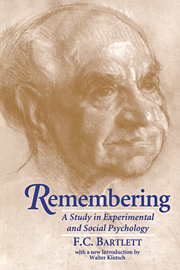Book contents
- Frontmatter
- Contents
- Biography of Sir Frederic C. Bartlett
- Introduction by Walter Kintsch
- Preface
- PART I EXPERIMENTAL STUDIES
- PART II REMEMBERING AS A STUDY IN SOCIAL PSYCHOLOGY
- Chapter XIII Social Psychology
- Chapter XIV Social Psychology and the Matter of Recall
- Chapter XV Social Psychology and the Manner of Recall
- Chapter XVI Conventionalisation
- Chapter XVII The Notion of a Collective Unconscious
- Chapter XVIII The Basis of Social Recall
- Chapter XIX A Summary and Some Conclusions
- Index
- Plate section
Chapter XVII - The Notion of a Collective Unconscious
Published online by Cambridge University Press: 04 August 2010
- Frontmatter
- Contents
- Biography of Sir Frederic C. Bartlett
- Introduction by Walter Kintsch
- Preface
- PART I EXPERIMENTAL STUDIES
- PART II REMEMBERING AS A STUDY IN SOCIAL PSYCHOLOGY
- Chapter XIII Social Psychology
- Chapter XIV Social Psychology and the Matter of Recall
- Chapter XV Social Psychology and the Manner of Recall
- Chapter XVI Conventionalisation
- Chapter XVII The Notion of a Collective Unconscious
- Chapter XVIII The Basis of Social Recall
- Chapter XIX A Summary and Some Conclusions
- Index
- Plate section
Summary
INTRODUCTORY REMARKS
In several respects the notion of a collective unconscious is the counterpart, in social psychology, of the notion of memory traces in individual or general psychology. Both appear to assume that psychological material—images, symbols, ideas, formulae—are somehow individually preserved and stored up for use, either in the central nervous system of the individual, or somewhere in a persistent psychical structure which is the possession of a social group. The whole notion of collective unconscious is excessively difficult to discuss with any clarity, for it has been developed in an extremely confused fashion. Within its scope all sorts of psychological ideas, very different in their essential character, have been jumbled together.
Before I attempt discussion, it may be well to restate briefly the position which I have already reached.
When a number of people are organised into a social group, whether by appetite, instinct, fashion, interest, sentiment, or ideal, this group speedily develops certain characteristics peculiar to itself, which directly constrain the behaviour of its individual members. I have throughout treated these characteristics as the expression of active tendencies, for we have to consider them, not merely descriptively, as they are expressed in institutions, symbols, catch words, codes, and material culture, but also causally, as actual determining conditions of conduct and experience.
- Type
- Chapter
- Information
- RememberingA Study in Experimental and Social Psychology, pp. 281 - 292Publisher: Cambridge University PressPrint publication year: 1995



